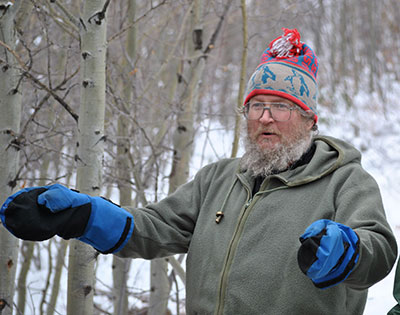The late Allan Priddy* is one of the most knowledgeable and experienced survival experts that I've ever known. He could throw up a thermal shelter in less time that it takes to type this paragraph. And his voice? Let me tell you about his voice. He had a voice which could be heard in the next county over. Allan was thoughtful, smart and colorful, and he was the perfect person to highlight in an article that I prepared on winter survival for Cross Country Skier some years ago. You'll see his coffee can  survival kit pictured on the final photo of that article. The survival community lost a kindhearted and influential presence when he died in the spring of 2020.
survival kit pictured on the final photo of that article. The survival community lost a kindhearted and influential presence when he died in the spring of 2020.
This is Allan Priddy's "coffee can surival kit." It is a compact kit that can be carried in the car, on the boat, or in a pack for hunting, hiking, exploring, etc. Most of the contents will fit in a metal, one-pound coffee can (or mixed nuts or larger sized food cans). It needs to be metal because it doubles as a pot for melting snow. It's also a device with which to dig an emergency snow shelter. (However, if you can carry it, include a small shovel for winter peregrinations. It is far, far better than trying to use a coffee can.) You should be aware that if this kit is carried while on hiking or hunting trips, you still need to carry the other Ten Essentials not included below.
Keep three points in mind when putting together a survival kit. First, make it small enough that you'll actually carry it and not leave it home. Second, use the list as a guide and customize it to your needs. For instance, if you are allergic to insect bites, bring the appropriate medicine, or carry appropriate wrap if you have knee problems.
Thirdly, bring enough to enable you to spend at least one night out. It is usually the first 6 hours that determine whether you'll be able to survive an emergency. If you can make it through the first night, then your chances are good that you can make it a few more nights if necessary.

General Items
◻Braided nylon rope (25 feet)
◻Mirror
◻Matches (2 boxes)
◻Fire Starter
◻Poncho (bright orange to attract attention)
◻Toilet paper
◻Candle (wrapped in aluminum foil)
◻Paper and pencil
◻Fishing line, hooks, split shot leads
◻Knife
◻Whistle
◻Money ($20 bill: you never know when it might come in handy)
◻Garbage Bags (2 large size bags)
◻Bright orange surveyor's tape
Repair Kit
◻Sewing kit
◻Dental floss (It's strong and useful as thread for sewing, or a fishing line or for lashing branches for improvised shelters.)
◻Safety pins
◻Wire (bailing wire)
First Aid Kit (Also see Lightweight First Aid Kit)
◻Moleskin
◻Sterile pads (2 x 2 and 4 x 4)
◻Sterile Gauze
◻Neosporin
◻Bandaids
◻Aspirin
◻First Aid Tape
Nourishment
◻Honey Packages (available in small foil packages available at convenience stores)
◻Instant Soup or tea (a couple packages)
Optional
◻Folding saw
◻Compass (learn how to use)
 ◻Hard Candy
◻Hard Candy
Carrying container
◻Coffee Can (1 lb size) or mixed nuts cans or nylon stuff bag
All contents except the plastic bags and the optional items will fit in a 16 oz can. (Or you can flat "Spam" cans or oval-shaped containers available at outdoor stores.)
The plastic bags can be affixed to the outside of the can with a rubber band. To keep things from rattling in the can, wad up some wax paper and stuff it around the items. The wax paper stays dry and also doubles as a fire starter. To save weight the contents can be placed in a stuff bag and a metal cup can be used instead of the coffee can.
_____
* Allan Priddy was awarded the Antarctica Service Medal through the National Science Foundation for his time working south of the Antarctic Circle and a winter-over at McMurdo Station. In 1992 Priddy Glacier, a two-nautical, mile-long glacier located in Victoria Land, Antarctica, was officially named for Allan R. Priddy by the Advisory Committee on Antarctic Names. Allan passed away unexpectedly in May of 2020.
[END]
